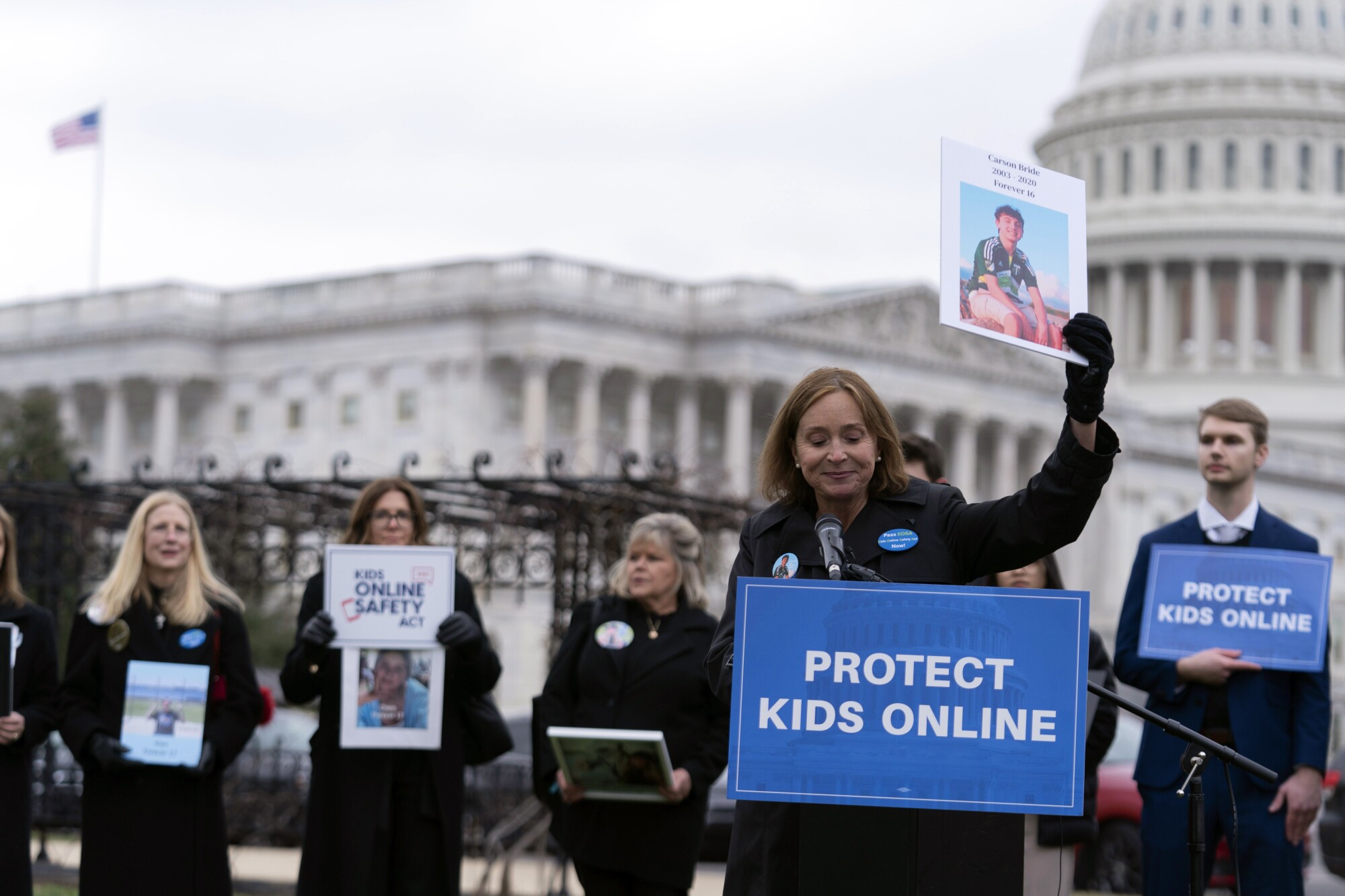Sixteen-year-old Carson Bride died by suicide in June 2020 after intense cyberbullying on Snapchat by people using apps to anonymize their identity. His mom, Kristin Bride, a Democrat in Oregon, found solace in Maurine Molak — a Republican in Texas whose son had died by suicide four years prior after cyberbullying on Instagram and GroupMe.
“I absolutely needed to talk to somebody whose son had died the same way,” Bride told NOTUS. “She really gave me hope that there was a path forward to live with this tragedy.”
The two women are now part of a nationwide coalition of parents who’ve set aside their partisan differences to demand restrictions on social media, a policy push that is gaining political momentum and putting the world’s largest tech companies on the defensive.
In a push that has accelerated in the last year, a flurry of both red and blue states have considered or already approved sweeping new laws restricting how social media platforms can interact with kids. Utah did. So did California. And Florida outright banned social media platforms for kids, unless companies remove “addictive features.”The state-level effort comes as Congress has passed legislation requiring the sale of TikTok and is debating regulating other platforms under the Kids Online Safety Act.
“When you do this work, you set your politics aside, you absolutely have to, and you stay focused on the goal,” Bride said. “For the parents, we all share the grief, the guttural emptiness of ourselves like we’ve had a part of our bodies completely ripped out of us,” Molak told NOTUS.
Advocates, lawmakers and political strategists from both parties say these parents have become a political force comparable to Mothers Against Drunk Driving, the movement that originated in the 1980s to strengthen drunk driving laws. They’ve done so in a much more politically polarized era, they add, making the effort more unusual and significant.
“To me, it has felt very much like the modern-day MADD where these parents are sounding the alarm in grief,” said Shelby Knox, campaign director of online safety at the advocacy group ParentsTogether Action.
Political operatives say the cross-partisan turn against social media platforms is an outgrowth of the broader push against Big Tech companies, including technology monopolies.
Advocates also point to youth regulations as a political winner, even when broader tech regulation is more contentious. Almost three-quarters of both Republicans and Democrats support requiring age verification to use social media, according to a poll from the Pew Research Center last year.
And Republican voters, traditionally more skeptical of government intervention in private companies, have been primed by former President Donald Trump’s repeated criticisms of the tech industry, advocates said.
“This is one of the reasons why members are focused on social media, because Trump made it a cause célèbre to attack tech, not for risking our democracy or hurting our kids, which is what the liberals were doing, but for allegedly shutting down conservative speech,” said Danny Weis, chief advocacy officer for the advocacy group Common Sense. “And that remains today as a tack-on for a lot of conservatives.”
“Anytime we start talking about tech in focus groups, social media just pops,” said veteran GOP pollster Wes Anderson. “It can be swing voters, it can be Republican voters, I don’t care who it is.”
That kind of broad support explains why state legislatures that represent the opposite ends of the political spectrum have passed laws regulating social media use in the last two years.
Lawmakers have generally pursued two kinds of regulations aimed at social media companies: outright bans, like in Florida, and legislation that prevents the platforms from collecting data about users who are minors, like in Maryland.
“We’re hearing from parents that they think it’s absolutely necessary we move forward as quickly as possible before more kids die,” Democratic Sen. Richard Blumenthal, who is co-sponsoring KOSA in the Senate with Republican Sen. Marsha Blackburn, told NOTUS. “They view it as lifesaving, and they’re demanding that we move forward as promptly as we can. There’s a sense of urgency among parents.”
Two Floridians, Democratic Rep. Kathy Castor and Republican Rep. Gus Bilirakis, filed a House version of the bill this month.
Many advocates also point to the experiences of parents during the coronavirus pandemic in 2020, when they saw up close how using the platforms affected their child’s mental well-being, as the foundation for the recent legislative push. Some parents were also stirred to action by the 2021 testimony of former Facebook data scientist Frances Haugen, in which she said the social media company knows its platform can cause harm to minors.
Big tech companies are pushing back against the movement to regulate social media for kids, and they’re getting help from digital privacy and free speech organizations.
Some LGBTQ+ rights groups are concerned the federal bill incentivizes platforms to censor queer and trans content.
Some have pointed to Blackburn’s previous comments against trans content online as evidence right-wing groups could weaponize the bill to advance an anti-LGBTQ+ agenda. The Heritage Foundation said on X last year it supported KOSA blocking access to trans content.
“There are good faith supporters of the bill who want to take on Big Tech and stop exploitative practices that harm children and adults in the name of greed.” Evan Greer, director at the digital rights group opposing the bill, Fight for the Future, wrote in Vice last fall. “Unfortunately, these supporters are trading the rights of marginalized people for expediency in passing a dangerous bill.”
Senators filed a new version of the federal bill in December, modified to address some opponents’ concerns, and most large LGBTQ+ advocacy groups withdrew their opposition. But multiple LGBTQ+ groups, as well as the ACLU, remain opposed.
Last year, a district court judge blocked California’s social media law from taking effect, saying the measure likely violated the First Amendment. California’s attorney general is seeking to overturn the injunction.
ParentsTogether told NOTUS it endorses changes “at the design level” — which it sees KOSA as doing, unlike some state-level legislation. Knox said, “There’s simply no way to stop kids from accessing social media that doesn’t actually do anything at the end of the day to keep kids on the platform safe.” (Knox added that she thought a new law signed by President Joe Biden on Wednesday that could effectively ban TikTok in the United States would do little to curb the problem posed by social media to kids.)
Some regulation advocates criticize the outright bans, saying they are both unrealistic and go too far to prevent minors from accessing information that could be helpful to them.
“Book bans, they sort of overlap in some ways with the folks saying, ‘Let’s just keep kids away from certain types of access,’” Marisa Shea, a senior policy manager for 5Rights U.S., a group helping draft state-level legislation, told NOTUS. “I think that’s some of the places where we see a partisan divide, more at the state level.” (While Florida’s law did have bipartisan support, nine Democrats across the House and Senate, mostly progressives, opposed it.)
Officials with NetChoice, a group representing many of the tech industry’s biggest companies, like Meta, also object to attempts to regulate these social media companies, saying both the outright bans and attempts to prevent tech companies from collecting data on minors create more problems than they solve and represent free speech violations.
Carl Szabo, vice president and general counsel for NetChoice, said elected officials would be better off funding public service announcements for announcements warning them to pay close attention to their children’s social media use rather than mandating bans.
“Is there a role for government?” Szabo said. “It’s finding ways to get parents more involved in their kids’ lives. But it’s not to violate free speech, not to create ID for the internet, but to help parents, not try to replace them.”
The growing group of parents, like Bride and Molak, whose path to activism on social media was a tragic loss — say they were involved, and it isn’t enough.
“I’m in these meetings with all of these other parents, and I look around the room and I realize I’ve been the one that’s been at it the longest, and I think, all of these parents would not be sitting here had Congress acted eight years ago when I first started having these conversations,” Molak told NOTUS. “That’s what is so sad for me — they shouldn’t be there.”
If you or someone you know needs emotional support or are in crisis, call the Suicide & Crisis Lifeline at 988.
—
Claire Heddles is a NOTUS reporter and an Allbritton Journalism Institute fellow. Alex Roarty is a reporter at NOTUS.
Sign in
Log into your free account with your email. Don’t have one?
Check your email for a one-time code.
We sent a 4-digit code to . Enter the pin to confirm your account.
New code will be available in 1:00
Let’s try this again.
We encountered an error with the passcode sent to . Please reenter your email.



